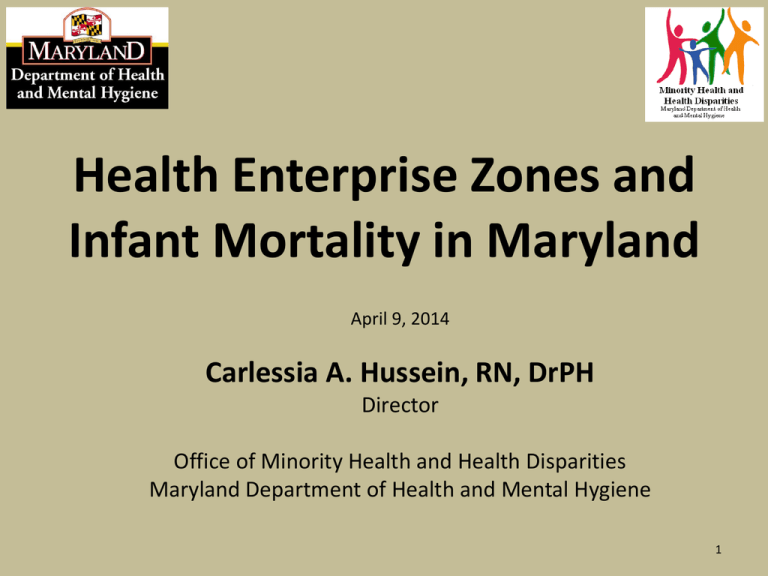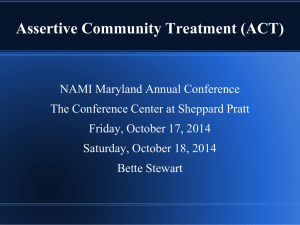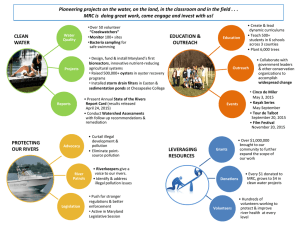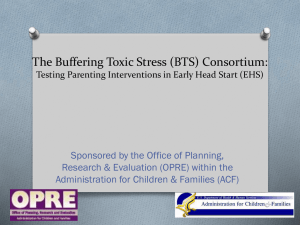Health Enterprise Zones and Infant Mortality in
advertisement

Health Enterprise Zones and Infant Mortality in Maryland April 9, 2014 Carlessia A. Hussein, RN, DrPH Director Office of Minority Health and Health Disparities Maryland Department of Health and Mental Hygiene 1 Maryland is One of the Most Racial/Ethnic Diverse States 45% minority 4 jurisdictions >50% minority 6 jurisdictions >40% minority 9 jurisdictions >33% minority Out of 24 jurisdictions 2 Disparities by Race/Ethnic Group Selected Racial and Ethnic Health Disparities in Maryland (Shows how many times higher the minority rate is compared to the White rate) 3 Unadjusted ED Visit Rates per 100,000 for Diabetes, by County, Black vs. White, Maryland 2011 1600 1400 Both Place and Race Matter to this rate 1200 Black 1000 800 600 400 200 0 Maryland White Hospital Admission Rate Disparities Black vs. White • For Ambulatory Care Sensitive Conditions (or AHRQ Prevention Quality Indicators) for Maryland: • Kid’s Asthma: Black rate is 3.1 times higher • Adult Asthma: Black rate is 2.7 times higher • Adult Hypertension: 4.5 times higher • Adult Congest Heart Fail 2.6 times higher • Various Diabetes metrics 2.6x to 4.6 x higher • (data from AHRQ State Snapshots as presented in the MHQCC Health Disparities Workgroup Report) 5 Cost of Disparities in Maryland • Minority Health Disparities cost Maryland between 1 and 2 Billion Dollars per year of direct medical costs. • Excess charges from Black/White hospitalization disparities alone were $814 Million in 2011. – These are just the hospital charges, NOT including physician fees for hospital care, emergency department charges, or any outpatient costs. 6 Maryland Health Disparities Workgroup • Convened by Maryland Health Quality and Cost Council in 2011 (Council chaired by Lt. Gov Brown and Sec Sharfstein) • Workgroup Chaired by Dean Reece of U of MD School of Medicine, included diverse experts on minority health • Maryland Office of Minority Health and Health Disparities staffed workgroup and co-drafted Final Report in 2012 • Report Recommendations: • Health Enterprise Zones (HEZs) • Maryland Health Innovation Prize • Racial and Ethnic tracking of health care delivery performance 7 Report Implementation • Legislature passed Maryland Health Improvement and Disparities Reduction Act of 2012 based on the Report • Administration funded HEZ program with $ 4 million per year for four years beginning in 2013 • State Health Department and the Community Health Resources Commission oversee implementation • Five HEZs were designated in January 2013 8 Maryland Health Improvement & Disparities Reduction Act of 2012 • Health Enterprise Zones • Racial / ethnic data from insurers (MHCC) • Racial / ethnic data for incentive programs: • Hospital incentives (HSCRC) • Patient-Centered Medical Homes (MHCC) • Hospitals report efforts to reduce Disparities • Health education institutions report efforts • Cultural competency workgroup of Health Quality and Cost Council 9 10 Health Enterprise Zones: Definition and Eligibility • A Health Enterprise Zone was defined in law as – A contiguous area of one or more zip codes – Experiencing documented poor health outcomes and health disparities – Experiencing documented economic disadvantage • Operationalized eligibility as – Bottom 50% on one of two poverty metrics, AND – Bottom 50% on one of two poor health metrics 11 Health Enterprise Zones: Provider Incentives • HEZ enabling legislation provides various statutory incentives for providers in the Zones: – State income tax credits – Hiring tax credits – Grants for equipment purchase or lease – Loan repayment assistance programs • These are contingent on – Participating in cultural competency training – Accepting Medicaid and uninsured patients – Participating with the Coordinating Organization 12 Health Enterprise Zones: Community Intervention • HEZ enabling legislation provides grants for community-level public health interventions: – Deploying community health workers – Increasing availability of fresh fruits and vegetables – Improving access to safe physical activity – Transportation assistance programs – Mobile crisis teams for mental health – Providing cultural competency training – Supporting community coalitions 13 Health Enterprise Zones: Principles for Proposals • HEZ call for proposals contained 13 principles that doubled as proposal review criteria. • Several key principles were: – Cultural, linguistic, and health literacy competency – Workforce diversity – Outreach and targeting of minority populations – Racial, ethnic & language data collection/reporting – Addressing social determinants of health – Balance between provider and community focus 14 Health Enterprise Zones: Progress and Future • Five HEZs designated in January of 2013 • To date, 43 new health providers of various types hired in the zones • Cultural competency training assistance • Programmatic technical assistance • Quarterly reporting on productivity and quality • External evaluation contract to be established 15 Infant Mortality in Maryland: DEMO Programs • MHHD is currently funding 3 pilot Minority Health Disparities Reduction Demonstration Grant (DEMO) sites for minority infant mortality in FY 2014 • DEMO Programs utilize: – Minority Perinatal Navigators, CHWs, and health promoters; – Community coalitions and taskforces; – Increased community outreach and education; – Enhancement of clinical services; – Infrastructure for Program Sustainability; – Inter-county collaboration. 16 Infant Mortality in Maryland: General Background • Racial and Ethnic Breakdown of births and infant deaths, Maryland 2012 2012 Births % total White 42,791 59% 174 38% 4.1 Black 24,306 33% 251 55% 10.3 Hispanic 10,201 14% 56 12% 5.5 5,430 7% 21 5% 3.9 164 0% 1 0% 6.1 ** Asian Amer Ind Deaths % total Death rate * * Infant deaths per 1000 live births, the Infant Mortality Rate **American Indian rate varies greatly year to year due to small numbers 17 Infant Mortality Reduction in Maryland Maryland Infant Mortality Rates, 2006-2012, by Race, Maryland Vital Statistics Administration 25.0 Deaths per 1,000 Live Births 20.0 Black 15.0 10.0 White 5.0 0.0 2005 2006 Maryland Black 2007 2008 Maryland White 2009 2010 Linear (Maryland Black) 2011 2012 2013 Linear (Maryland White) 18 Racial/Ethnic Population in Delaware Racial or Ethnic Minority Population, by Jurisdiction, Delaware, 2010 33.7% minority 2 jurisdictions >33% minority Out of 3 jurisdictions % Minority New Castle 37.5% Kent 33.4% Sussex 23.5% Delaware 33.7% 19 Infant Mortality in Delaware: General Background • Racial and Ethnic Breakdown of births and infant deaths, Delaware 5-Year Average, 2006-2011 2006-2011 Births % total White 7,818 68% 46 51% 5.9 Black 3,140 27% 42 46% 14.2 598 5% 3 3% 5.2 Other Race Deaths % total Death rate * * Infant deaths per 1000 live births, the Infant Mortality Rate 20 Infant Mortality Reduction in Delaware Delaware Infant Mortality Rates, 2004-2011, by Race, Delaware Vital Statistics Administration 25.0 Deaths per 1,000 Live Births 20.0 Black 15.0 10.0 White 5.0 0.0 2003 2004 Delaware White 2005 2006 Delaware Black 2007 2008 2009 Linear (Delaware White) 2010 2011 2012 Linear (Delaware Black) 21 Disparities Reduction Principles HEZs Community coalitions DEMO Program Community coalitions and taskforces Community health workers and workforce Minority Perinatal Navigators, CHWs, and diversity health promoters Outreach and targeting of minority populations Increased community outreach and education Addressing social determinants of health Linkage to community resources Provider Incentives (tax credits, loan repayment) Enhancement of clinical services Evaluation and Sustainability Infrastructure for Program Sustainability Chronic Disease Utilization Chronic Disease and Infant Mortality 22 Linkages to Maryland HEZs DEMO PROGRAMS Shared logic model and common operational design features HEZs Programs develop locally-targeted strategies for reducing infant mortality within a community Low Birth Weight is used in designation of HEZs & HEZs may choose to target Infant Mortality INFANT MORTALITY 23 Recommendations • Use HEZ/DEMO model to target infant mortality in clusters of zip codes • Identify specific small population groups by geographic areas where infant mortality rates and numbers are higher than the state average • Where small groups of individuals with infant mortality that is higher than acceptable, target communication in a culturally competent manner • Distribute infant mortality data trends information (rates and numbers) by small areas within counties • Activate a coalition of diverse interest groups ( health, citizens, elected officials, faith-based, etc.) to focus on reducing infant mortality as a community • Engage in innovative communication: movie theater ads, Man/Boys support groups, sports and entertainment personalities, grandma/senior citizen groups, etc. 24 Important Links Health Disparities Plan http://dhmh.maryland.gov/mhhd/Documents/Health%20Disparities%20Plan%202010.pdf Health Disparities Workgroup Final Report http://www.governor.maryland.gov/ltgovernorn/documents/disparitiesreport120117.pdf Cultural Competency Workgroup Report http://dhmh.maryland.gov/mhgcc/SiteAssets/SitePAges/meetings/Cult%20Comp%20Full%20Report%2012.13. pdf Maryland Chartbook of Minority Health and Minority Health Disparities Data http://dhmh.maryland.gov/mhhd/Documents/Maryland-API-Data-Report-2013.pdf 25 Contact Information Office of Minority Health and Health Disparities Maryland Department of Health and Mental Hygiene 201 West Preston Street, Room 500 Baltimore, Maryland 21201 Phone: 410-767-7117 Fax: 410-333-7525 Website: www.dhmh.maryland.gov/mhhd Facebook: www.facebook.com/Marylandmhhd Twitter: @MarylandDHMH Email: dhmh.healthdisparities@maryland.gov 26








